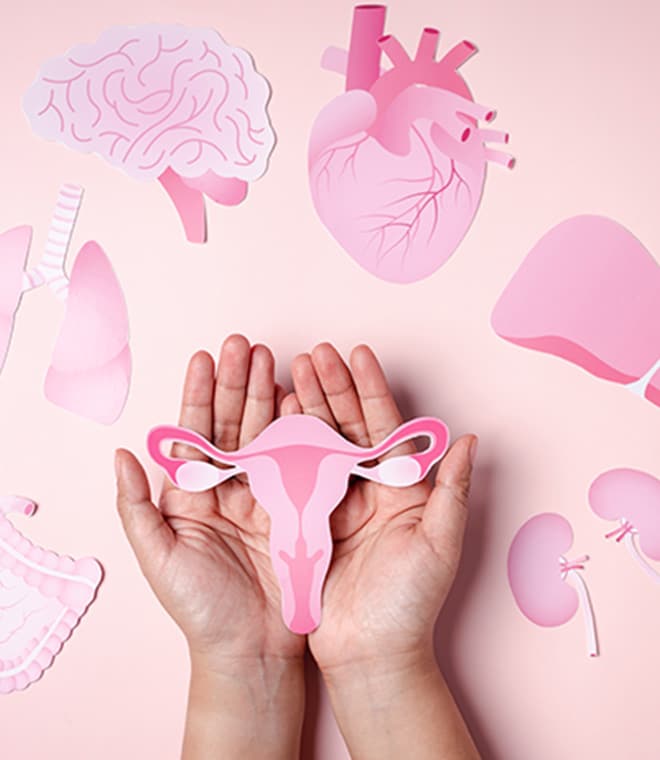Health
Menopause FAQ: Find answers to your menopause questions
By Patricia Ann Convery, MD, Fellow, American College of Obstetrics and Gynecology Mar 27, 2025 • 7 min
Although menopause is a normal phase of life, many women don’t know a lot about it when they’re going through the process. If you’re at the beginning of menopause or entering your 40s or 50s, you may worry about what will happen, or you may wonder if other women are experiencing the same symptoms you are. Here you’ll find answers to some of the most frequently asked questions regarding menopause.
What is perimenopause?
Perimenopause is the first stage of menopause. During this stage, your body goes through changes. You may release eggs less regularly and produce less estrogen and other hormones, leading to changes in your menstrual cycle.
At what age does perimenopause start?
For most women, perimenopause begins in the mid-40s. However, some women may begin earlier or later.
When do periods stop?
Your periods (menstruation) may stop for many different reasons. In a healthy person, periods stop for good after menopause, when the ovaries stop releasing eggs. Menstruation also stops temporarily during pregnancy.
Some medical conditions, like polycystic ovarian syndrome (PCOS) and thyroid disease, can also cause periods to stop. Stress, sudden weight loss, and being overweight or obese can also temporarily pause your periods. If your periods stop, talk to your healthcare provider.
What are the symptoms of perimenopause?
Menstrual changes are a common symptom of menopause. Your periods may become irregular, and your menstrual flow may become heavier or lighter than usual. Other common symptoms of perimenopause include hot flashes, night sweats, vaginal dryness, an increased need to urinate and sleep problems. Mood changes like irritability, mood swings, anxiety and depression may also occur.
How long does perimenopause last?
The average length of perimenopause is approximately four years. However, duration varies greatly depending on the individual. Some women are only in perimenopause for a few months while others may have perimenopause symptoms for 8 to 10 years.
How early can menopause start?
Healthcare providers consider menopause to be normal if it starts after age 45. However, some women experience early menopause, which occurs between ages 40 and 44.
Menopause can begin as early as your 20s or 30s. When this happens, it’s called premature menopause. In most cases, premature menopause has a medical cause like autoimmune disease or surgery to remove the ovaries.
What is the average age of menopause?
The average age for menopause in the U.S. is 51 or 52 years. However, many women experience menopause earlier or later.
What does postmenopausal mean?
Postmenopausal is an adjective that describes a woman who has reached menopause. You are considered postmenopausal after you have gone 12 months without a menstrual period and there isn’t any other explanation for your periods stopping.
How long does menopause last?
Menopause is the point in time when you haven’t had a period for at least 12 months and your lack of menstruation isn’t due to a medical cause. It isn’t a stage that lasts for a set amount of time. Until you reach menopause, you are in perimenopause. Then, you enter postmenopause right away. The symptoms of menopause may be unnoticeable or they may continue for several months or years. Perimenopause, the phase leading up to menopause, may last just a few months in some cases while in other cases, it can last 8 to 10 years
When does menopause end?
You have reached menopause when you go without a period for 12 months. At that point, perimenopause ends and postmenopause begins. Women may continue to have menopause symptoms for months or years after their periods stop.
What signals the end of menopause?
Menopause itself doesn’t have an endpoint. However, perimenopause ends when you haven’t had a period for 12 months and there’s no clear medical cause. After your periods stop, you reach postmenopause and you remain in that stage for the rest of your life. Symptoms of menopause typically diminish within four to five years of menopause. However, they may resolve sooner or later.
Can you get pregnant after menopause?
When you reach menopause, your ovaries stop releasing eggs, so you can’t get pregnant through natural means.
Although it’s more difficult to conceive during perimenopause due to egg number and quality, you can still get pregnant. You should continue to use contraception if you don’t wish to become pregnant during perimenopause.
Can periods restart after menopause?
Once you reach true menopause, your periods won’t restart because your ovaries stopped releasing eggs and stopped producing most of their estrogen. However, some women in perimenopause may get a period after going several months with no period.
Vaginal bleeding can occur after menopause. Changes in the linings of the uterus and vagina are often the cause. In some cases, these changes are harmless. However, they could also indicate more serious medical concerns like an infection, or uterine or cervical cancer. As a result, you should tell your healthcare provider about any vaginal bleeding or spotting that you experience after menopause.
Does menopause cause weight gain?
Menopause can cause weight gain in some cases. You may also find it more difficult to lose weight after menopause. A healthy diet and regular exercise are important for postmenopausal weight management.
Does menopause make you tired?
You may experience feelings of fatigue during perimenopause and the first years of postmenopause. Changes in hormone levels and/or sleep problems are usually the cause.
Anytime that you have questions about menopause, ask your healthcare provider. They can provide you with answers as well as tips to help you manage menopause symptoms. In addition, your provider can talk to you about medical treatments and self-care interventions that could help you feel more comfortable during perimenopause and beyond. There are also over-the-counter menopause products, which can be helpful for some women.
Updated by Julie McDaniel, MSN, RN, CRNI, March 2025.
Sources:
- https://www.mayoclinic.org/diseases-conditions/menopause/expert-answers/bleeding-after-menopause/faq-20058396
- https://www.womenshealth.gov/menopause/early-or-premature-menopause
- https://medlineplus.gov/menopause.html
- https://menopause.org/patient-education/menopause-topics/perimenopause
- https://www.womenshealth.gov/menopause/menopause-basics#2
- https://www.womenshealth.gov/menopause/menopause-symptoms-and-relief
- https://www.menopause.org/for-women/expert-answers-to-frequently-asked-questions-about-menopause/perimenopause-premature-menopause-faqs
- https://womenshealth.gov/menopause/menopause-and-your-health
- https://www.nia.nih.gov/health/menopause/what-menopause
- https://menopause.org/patient-education/menopause-topics/premature-menopause
- https://www.nia.nih.gov/health/what-menopause
- https://womenshealth.gov/menstrual-cycle/your-menstrual-cycle




